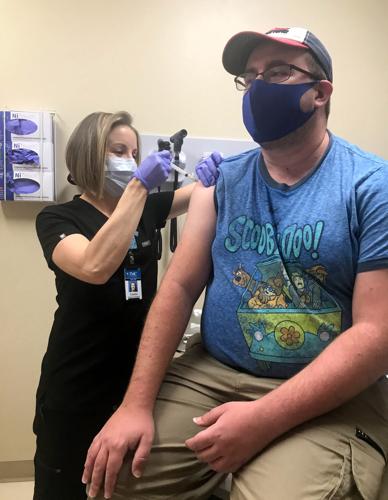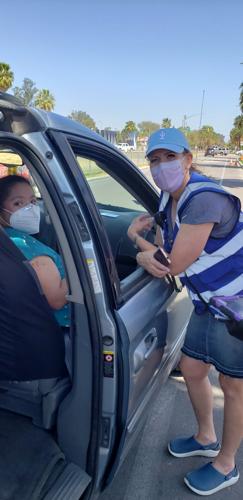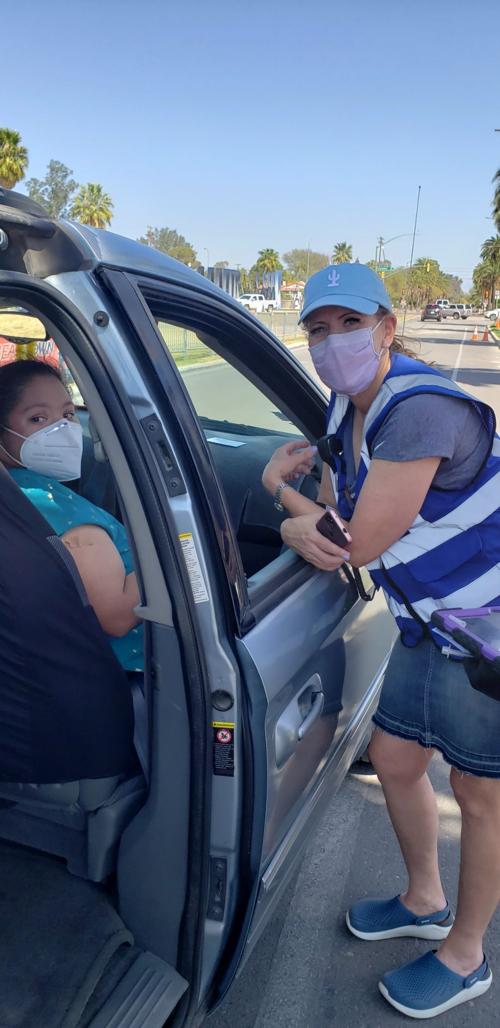Overlooked, vulnerable and feeling forgotten.
For some people with disabilities, getting the COVID-19 vaccine has been a long wait, a logistical nightmare or both.
“It’s set up to cater to people who are able-bodied, who are tech-savvy and who know how to search many different websites,” said Sey In, a staff attorney with the Arizona Center for Disability Law. “People are experiencing difficulties.”
Some of the problems In said he’s been hearing about include:
- The websites to sign up are not user-friendly or compatible with certain accessibility software.
- Accommodations at shot sites are not automatic.
- There are not enough auxiliary aids and services available such as large print materials or
- interpreters.
South Tucson resident Johanna Weisberg was anxious about accessing the shot for her husband, Germaine Moore, who has cerebral palsy and is blind. Weisberg said their challenge wasn’t unfriendly technology but waiting for him to become eligible, and staying safe in the meantime.
There was a push — when vaccines first became available in December — to include people with disabilities in the first eligible category, 1B, because many are highly vulnerable to the virus, said Dr. Will Humble, executive director of the Arizona Public Health Association and former state health director.
That didn’t happen.
It’s only been recently, nearly four months later, that people with disabilities have started feeling more hopeful about getting the vaccine, said Jon Meyers, executive director of the Arc of Arizona, a statewide advocacy group.
When the state-run sites opened up shots March 24 to everyone 16 and older, instead of allowing people with disabilities to get shots first as part of the 1C eligibility group, people felt overlooked.
“They were thrown into this mass of 5 million or so people,” he said, “and they had to compete for spots right when they were about to get some sort of prioritization.”
Weisberg said she kept close watch on the rollout and kept hoping for their chance. “But every time there was a change,” she said, “it was age-based.”
That changed in late March when Pima County’s vaccination sites deviated from the state’s updated protocols and instead opened it up to people 16 and older based on vulnerability. That included anyone living with a disability.
The Weisbergs were elated when a flyer on their doorstep announced a mobile “pop-up” clinic was coming to their neighborhood.
The shots, which they both received in late March, were brought to them through a collaboration between La Frontera Center, a social services provider, as well as the Pima County Health Department and Premier Medical Group.
“We Wish it had happened sooner”
Advocates say pop-up sites like the one offered in the Weisbergs’ community in late March are one of the best solutions for people with disabilities who are having trouble with scheduling or getting to a shot site.
That idea was one of several discussed during an online informational session recently hosted by the Arizona Developmental Disabilities Network. More than 100 people joined, and these are some of the stories shared by people seeking help and advice:
- A mother who needs to help her adult son, who has autism, prepare for the shot by doing several minutes of deep-breathing exercises with him right before the needle goes in.
- A woman who is deaf had to reschedule her shot because no one on site for her first appointment knew American Sign Language.
- A man who cannot get the shot in his arm because he doesn’t have enough muscle mass there to tolerate a needle.
Desert Survivors Nursery in Tucson is a non-profit organization that employs adults with intellectual and developmental disabilities.
Their experiences illustrate how people with disabilities, or loved ones advocating for them, must adapt in ways others don’t have to consider.
Several people on the call said the state and county computer programs were troublesome if not impossible for them to use. Many were instead trying to schedule by telephone.
What they are experiencing is not unusual.
Research by Kaiser Health News found websites providing vaccine registration options and COVID-19 information often violate disability rights laws and delay people with disabilities from accessing the vaccine.
Kaiser asked WebAIM, a nonprofit focused on web accessibility, to check 94 websites from 50 states and the District of Columbia. Accessibility issues were found in nearly all of them.
Another challenge is a lack of straightforward language a person with cognitive disabilities can easily understand, said Jamie Neidorf, who is with Tucson’s Direct Advocacy and Resource Center. The assumption is that everyone has someone who can help them, she said, “but that’s not true.”
More outreach is starting, however.
Since vaccinations were made available to all Arizonans 16 and older late last month, the state’s Division of Developmental Disabilities has contacted more than 11,000 members who had not yet received a first dose of the vaccine. It did so to share the criteria, to provide help if members cannot navigate the state’s website or need to schedule by phone, and to see about transportation needs.
The state has also provided vaccine for a clinic being held at the Ability360 Center on Saturday and Sunday, April 10-11, in Phoenix for people with disabilities living in that area. Appointments are required and, as of Friday, April 9, only 80 of the 2,000 spots were still open.
“Fingers crossed that this will prove that there is a need for events like this around the state,” said Meyers of Arc of Arizona. “This has been a long time coming, and we wish it had happened much sooner.”
“Hospitalization was traumatic enough”
For Steve and Kathy Freeman, the challenge was getting their 24-year-old daughter, Dominique, who has Down syndrome, to allow the shot when it recently became available to her.
She is terrified of needles, especially after spending two weeks in the hospital dangerously sick with COVID-19 and on a ventilator.
The Freemans were able to get Dominique the shot last weekend at the University of Arizona’s state site but only with the help of a registered nurse named Karen Schwartz, who is a nurse lead for the UA site.
Kathy Freeman said they gave Dominique a mild sedative before driving over, but their plan almost failed.
“She woke right up when they wiped her arm with the alcohol wipe,” Freeman said. Luckily, Schwartz was there to offer some kind words and encouragement.
“Nurse Karen came to the rescue,” Freeman said, “and it was a success.”
The entire Freeman family got sick with COVID-19 back in December. Steve Freeman was in the hospital for a few days because of low oxygen, and so was their other daughter, Alexis.
The sisters were across the hall from each other at St. Joseph’s Hospital, but Dominique was much sicker. The Centers for Disease Control and Prevention lists Down syndrome as a high-risk condition when it comes to COVID-19.
“It’s been so traumatic for her,” Kathy Freeman said of Dominique. “Her hospitalization was traumatic enough without us adding to it (with the shot).”

The entire Freeman family got sick with COVID-19 in December. Steve, right, and daughter Dominique, center, were hospitalized. “It’s been so traumatic for her,” says Kathy of her 24-year-old daughter, who has Down syndrome. Getting her vaccinated presented another challenge.
In late March, Sandy Roberson and her 28-year-old son, Alan, waited in line for a Johnson & Johnson shot at a mobile clinic, but the shots ran out before they got a chance.
Roberson said getting the vaccine for Alan, who has autism, has been a bit of a difficult decision. She’s afraid about how his body might react, but she’s even more afraid of having him get COVID-19.
On April 1, Alan got the shot at Tucson Medical Center’s Rincon Health Campus on East Drexel Road, and his mom is relieved.
Alan has been home constantly throughout the pandemic, she said, and it’s not good for him.

Alan Roberson, who has autism, gets a shot of the Johnson & Johnson vaccine at Tucson Medical Center’s Rincon Health Campus.
“I’ve got to get him back out there,” she said, “and have him work at trying to do relationships and friendships.”
“No time to waste”
There are about 9,000 Pima County residents with disabilities enrolled in the Arizona Long Term Care System, county data show, with another 10,000 or so outside that system.
Clinics are being planned for people who are blind or visually impaired, as well as those who are deaf or hearing-impaired, said Dr. Theresa Cullen, the county’s medical director. The county does not disclose the dates of these events because they are not open to the public.
Cullen said health officials are also trying to reach more people who are homebound and plan to use the one-dose Johnson & Johnson so just one visit is needed.
There is a link on the county Health Department’s web page for vaccine registration for homebound individuals, said Susan Graham, an administrative specialist with the department. She said people can also call the county’s help line to get help with registration.
So far, Pima County has administered more than 13,500 shots at 34 mobile clinics and there are more currently scheduled. The goal is to hold two or three mobile clinics each week. The county is also working to provide more transportation assistance to people who need it, Graham said.
In, of the Center for Disability Law, encouraged people who need accommodations to contact the government agency providing the shot to tell them what they need.
The Arizona Department of Economic Security is partnering with the Arizona Department of Health Services to reserve appointments at state-run vaccination sites for people with developmental disabilities. Those who are eligible will receive communication informing them of available appointment slots.
Consistently left behind
One of the things that frustrates people with disabilities and their advocates: The sites were designed in a hurry and people with disabilities are just starting to be accommodated.
“The bottom line is people with disabilities are always left out,” said Michael Hingson, a national disabilities advocate.
Hingson, who has been blind since birth, became well known after he escaped the north tower of the World Trade Center during the Sept. 11, 2001, terrorist attack. His former guide dog, Roselle, was by his side as they walked down 78 flights.
The state’s vaccination site has been updated with NVDA, which stands for NonVisual Desktop Access, on both Chrome and Firefox, said Steve Elliott, spokesman for the Arizona Department of Health Services. The state agency is still working to get Windows Narrator working as well. In Pima County, the state runs one site, at the UA.
“We work with our vaccination site partners to provide ASL interpreters and other support for individuals with disabilities,” said Holly Poynter, a spokeswoman with ADHS. “Our state vaccination sites have protocols in place to serve individuals who are deaf or hard of hearing including written communication materials to replace verbal communication when needed.”
If there is a vaccine site that’s not accessible, Hingson said the company he works for will provide programming free of charge. Hingson is the chief vision officer at AccessiBe, which provides web accessibility for people with disabilities.
“There’s no reason that websites should not be accessible today,” he said, adding that more than 20% of people in the country have a disability. “It’s a great time to hurry up and do it. There’s no time to waste.”
“Not enough energy” to fight infection
Michelle Bartlett’s 20-year-old son, Jacob, has Wolf-Hirschhorn syndrome as well as cerebral palsy, epilepsy, autism and mitochondrial disease.
“We’ve pretty much been at home since the pandemic started and are not able to take him out,” said Bartlett, who explained that especially due to the mitochondrial disease, her son would “not have enough energy in his cells” to fight off an infection like COVID-19.
People with a combination of disabilities like Jacob’s are three times as likely to have a severe response to COVID-19, she said, but his time to get the shot just became available.
“Every state has done the same thing, offering shots based on age,” she said. “It’s frustrating.”
That changed when the county recently opened up shots at its sites to those 16 and older with certain medical conditions. (Subsequently, it made another change, and appointments are now available to any country resident 16 and older).
In late March, after securing an appointment, Bartlett and Jacob headed to Tucson Medical Center to get his shot, but it didn’t work out because only the Moderna vaccine was being offered. Bartlett said they’d been advised to get Pfizer because it would be easier on Jacob’s system.
Back to the phone calls.
On March 31, they got a spot and headed over quickly to get Jacob his first dose of Pfizer.
Bartlett said she received her vaccine in January because she works a few hours a week as an attendant with United Cerebral Palsy, and her husband got his already as a retired member of the military.
Is your child giving you a hard time about wearing a mask? Experts give their tips
1. Let children ask questions
Updated
Lorraine Breffni, the executive director of Early Childhood at Nova Southeastern University’s University School Mailman Segal Center, said that all ages of children will have questions about face coverings. She said it’s important to get their cooperation with wearing masks.
The younger they are, the more basic the answers should be.
“Parents should say it’s to help them keep from getting themselves and getting other people sick,” said Breffni.
There are also social stories, learning tools for people with autism spectrum disorders, available online to introduce mask-wearing to children. Del Río-Roberts recommended these three (link 1 | link 2 | link 3).
“Start to process with the child ahead of time before the expectation that they’re supposed to be in school for an extended period of time,” said Del Río-Roberts.
2. Give time to transition
Updated
The first time a child wears a mask for an extended period of time should not be the first day of school. Parents should practice mask-wearing at home and make it a fun activity for the children by adding it to their places of play.
For children in special education, Del Río-Roberts suggested to slowly expose them for 15 minutes at a time and increase from there. Positive reinforcement — like a snack or extra playtime — is important, even if the child doesn’t reach the goal.
“Start early and start incrementally,” said Del Río-Roberts.
3. Customize masks
Updated
Just as adults have preferences for the type of mask they wear, children do as well. Adults should be flexible and allow children to experiment with what kind of mask they wear, whether medical, cloth or other types.
This also allows the tone of the mask to change. Children can personalize their masks with their favorite animals or cartoon characters.
4. Turn it into a routine
Updated
Breffni said it’s important that parents destress and make mask wearing an everyday task, just like brushing teeth.
Both experts advised against using punitive measures if children have difficulty keeping their masks on. For special needs children, Del Río-Roberts said to redirect their attention.
“If they’re trying to grab it, move their hand or shift their attention to another task,” said Del Río-Roberts.
5. Learn by example
Updated
Children will notice and emulate adults complaining about wearing a mask every day.
“If we make it an everyday practice and don’t push our own fears, they can take it very matter-of-factly,” said Breffni.
There is also more to preventative measures than wearing masks, and adults should use positive reinforcement to encourage good hygiene in all aspect of their lives.
Some Tucson charter and private schools reopen, prompting complaints about safety
UpdatedSome Tucson charter and private schools have reopened for traditional in-person learning despite Pima County falling short of meeting state benchmarks to safely do so.
The decision to reopen by the schools, which serve thousands of Tucson children, have prompted concerns about public health during the pandemic and complaints of packed classrooms and lax mask-wearing.
“Each school is grappling with the spread of COVID-19 in their community, which is why it’s imperative that schools heed the concerns of teachers, parents and families in making evidence-based decisions,” said Arizona schools chief Kathy Hoffman.
Those evidenced-based decisions may be made in consultation with benchmarks set by the Arizona Department of Health Services, which lay out when virtual learning, hybrid models and in-person instruction are recommended based on data related to hospital visits, a decline in cases and the percentage of positive coronavirus tests.
However, the state’s reopening metrics are merely suggestions, not something schools are required to follow.
As of Thursday, Pima had met two of the three state criteria, failing to have two consecutive weeks with fewer than 7% positive COVID-19 tests.
Though Arizona Gov. Doug Ducey has said the decision to make the health metrics optional is designed to give communities autonomy, some schools may be incentivized to open their doors for a shot at state grants, which allot higher funding amounts for those that physically put children in seats.
Schools that opt to primarily offer virtual learning may also qualify for the grants to assist with funding shortfalls that result from a decline in enrollment and the cost of coronavirus-related measures, but at lower amounts.
Tucson’s nine major school districts continue to primarily offer remote learning, with the exception of those offering on-site care as required by the state to at-risk students. Even then, two schools have been closed and classrooms on one campus were shuttered following confirmed cases in both children and adults.
QUESTIONABLE PRACTICES
Leman Academy of Excellence, with four campuses throughout Tucson serving more than 2,500 children, resumed in-person classes on Aug. 17. Just two days later, a staffer from the east campus, at 10100 E. Golf Links Road, filed a complaint with Pima County.
Though the charter is offering remote learning for families who want that option, the complaint described 26 to 28 students packed into a room that is 27-by-27 feet with additional furniture, built-in shelves, and walkways at the back and the front of the class, leaving about 1 foot of space between desks.
Leman Academy of Excellence Head of Schools Dennis M. O’Reilly would not answer any questions from the Star. Safety measures shared on the school’s website include grade-level cohorts, enhanced cleaning, continuing recess with disinfection of equipment between use, teachers rotating classrooms instead of students, mask requirements for all students and social distancing when possible.
Three teachers at three local Leman schools also told the Star about crowded classrooms with children sitting less than 3 feet apart; they said roughly 60% of the student body is attending in person; there is no social distancing in hallways or on playgrounds; masks are not being worn consistently by children and some staff members; cleaning is inadequate; and teacher safety is not prioritized.
Kelsey Montaño, a parent at Leman Academy in Marana, opted for remote learning for the first quarter. Although Montaño felt Leman’s plan had a lot of good precautionary measures, she says social distancing with that many kids in the classroom is “almost impossible."
“Honestly, I was surprised that they went back as soon as they did,” she said. “I thought they were geared for protection. And then all of a sudden they’re going back in person. That did kind of feel rushed. It was kind of unexpected.”
The Leman Academy governing board voted to return to in-person instruction on Aug. 10, giving teachers one week’s notice they would be returning to the classroom.
O’Reilly sent a letter to families the week of Aug. 17 that included a USA Today opinion article by Dr. Elinore McCance-Katz, assistant health and human services secretary for mental health and substance abuse. McCance-Katz argued that schools should reopen because the mental health impacts on children outweigh the risk of the virus.
“The Trump administration and I simply believe that all children have a right to an education, which means the right to attend public schools and all parents have the right to weigh the very real risk of harm from being out of school against the risk of potential harm from COVID-19,” the article says.
Pima County’s school liaison team addresses all complaints directly with schools, said Aaron Pacheco, Pima County Health Department spokesman. The county tells them about the complaint and provides education specific to COVID-19 prevention at schools.
DATA INTERPRETATION
After the Leman Academy governing board voted to return to in-person instruction, the board governing Legacy Traditional Schools quickly followed suit, voting on Aug. 13 to reopen on Aug. 24.
On Aug. 23, Legacy Superintendent Nicole Kirkley sent a letter to families saying the schools were meeting the state’s guidelines for reopening for in-person learning.
That wasn’t the case, however, in Pima County, where the north Tucson campus is located.
“The current data indicates a moderate spread (yellow), which according to ADHS indicates a hybrid learning model where some students are in physical buildings and some are distance learning,” Kirkley wrote.
The data that Legacy was relying on wasn’t on the Arizona Department of Health Services’ page of benchmarks for schools and child care but buried in the “laboratory testing” data point, which provided more up-to-date, although incomplete, data.
Health officials don’t use data from the most recent three weeks when gauging safety in reopening schools because it is incomplete and changes due to delayed test results and data cleaning, which includes taking out duplicates if someone got tested more than once in a short period of time or transferring cases if a person got tested in Pima but lives in another county, Pima County’s Pacheco said.
“Due to delays in how soon people get tested, how soon those results are reported, and the need to verify and correct that data, it would be misleading to use current statistics ... to make such important decisions,” Pacheco said.
When told that the data was not reliable because it’s incomplete, Legacy spokesman Matthew Benson said, “The data is always quote unquote incomplete.
“To say that Pima County isn’t going to use any numbers from the last two or three weeks because they consider it, quote unquote incomplete and so then everybody just has to be in a state of flux, that’s absurd,” he said.
Besides the decline in cases in Pima County, the Legacy governing board voted to return to in-person instruction because of its comprehensive health and safety plan, Benson said, which includes universal mask wearing, social distancing, reduced class sizes, different traffic patterns in hallways and enhanced sanitation protocols.
The other key factor is “this is what Legacy families have been pleading for,” Benson said. “The demand has been overwhelming from Legacy families.”
He said 30% to 40% of students opted for remote learning while 60% are in person, for an average of 20 students in a class. According to last year’s enrollment, 60% of the school would be 715 students.
Caroline Wagner, a library aide who worked at the Tucson school for nine years, decided to quit at the prospect of going back so soon.
Wagner has a heart issue that puts her at higher risk. She would have been going into five classrooms a day, seeing 100 to 150 kids daily, she says.
“It was a hard decision because I loved my job,” she said. “I loved working with the kids, but I didn’t feel like I should have to risk my life for my job. And I’m one of the lucky ones because I didn’t have to work. I was working because I enjoyed it.”
Three local Legacy teachers told the Star other staff members had resigned, something Benson said he wasn’t aware of. They also shared concerns about inconsistent mask wearing amongst students, and a lack of social distancing in class and at lunch.
Wagner says if the school had waited until after Labor Day to open like most schools across Tucson are doing, she may not have left.
PRIVATE-SCHOOL COMPLAINTS
Two Tucson private schools — Pusch Ridge Christian Academy and Casas Christian School — were the focus of other complaints to Pima County, specifically about mask-wearing, which is mandated countywide for anyone over 5 years old.
Pusch Ridge, which serves about 700 students in grades K-12, opened for in-person instruction on Aug. 17. Families were told in a letter from the school’s headmaster, the Rev. Allen Cooney, that the school would “extend the general requirement of wearing cloth face masks” for the upper grades for two weeks, but that the requirement does not pertain to children in kindergarten through fifth grade.
Cooney told the Star via email that Pusch Ridge was taking a number of safety precautions, including screening for symptoms, physical distancing, hiring health service coordinators, forming a medical advisory board, frequent hand-washing and sanitizing, reduced class sizes, plexiglass barriers, one-way hallways, staggered lunch times, added precautions for vulnerable teachers, and training for students, and the faculty and staff.
The younger grades are in cohorts of 13 to 18 students, “meaning they don’t trade classrooms like middle school/high school classes do,” Cooney said.
Casas Christian did not respond to questions from the Star. But its reentry plan online says masks are required in special classes like Spanish, music and art, and that fourth through eighth grade students need to wear masks when they leave the classroom and are in hallways.
They also have a modified seating plan that includes three children facing each other at one table with 33 inches between them, the continuation of recess and school sports, maximum group sizes of 50 and teachers disinfecting knobs, student desks and chairs at the end of each class.
“Our specific COVID-19 response processes and rationale are ... the result of prayerful collaboration between church, school staff and school board personnel,” the plan says.
Photos: Back-to-school in Tucson during the pandemic
"Mustang Stampede"
Updated
Maddy Jacobs, 7, middle, reaches for her remote learning tool kit from her teacher, Kris Green, as her friend, Carly Kupinski, 6, watches during a "Mustang Stampede" at Manzanita Elementary School for the first day of school on August 17, 2020.
First Day of School, John B. Wright Elementary
Updated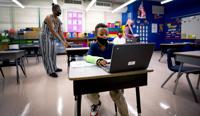
Augusta Iranzi, center, attends his teachers online class while monitors Jasmine Phillip, left, and Nadifo Yusuf, watch students inside a classroom at John B. Wright Elementary School, 4311 E. Linden St., in Tucson, Ariz. on August 17, 2020. About 10 students came to school for online instruction under the guidance of classroom monitors.
"Mustang Stampede"
Updated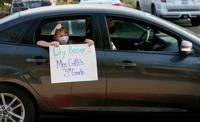
Lily Baser, 8, identifies herself for easy remote learning tool kit pickup during a "Mustang Stampede" at Manzanita Elementary School for the first day of school on August 17, 2020.
"Mustang Stampede"
Updated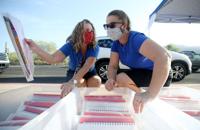
Krista Westmoreland, left, a third grade teacher, shows the remote learning tool kit of a student to Anna Ames, music teacher, during the "Mustang Stampede" at Manzanita Elementary School for the first day of school on August 17, 2020.
"Mustang Stampede"
Updated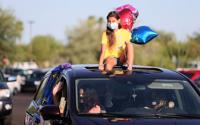
Maya Brown, 9, rides in style for her remote learning tool kit pickup during a "Mustang Stampede" at Manzanita Elementary School for the first day of school on August 17, 2020.
"Mustang Stampede"
Updated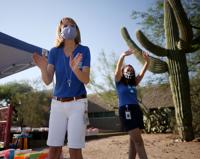
Multiage teachers Kris Green left, and April Pollow greet and cheer on their students during a "Mustang Stampede" at Manzanita Elementary School for the first day of school on August 17, 2020.
"Mustang Stampede"
Updated
Maddy Jacobs, 7, left, waves to her teacher as she stands in the sunroof with her friend, Carly Kupinski, 6, during a "Mustang Stampede" to pickup their remote learning tool kit at Manzanita Elementary School for the first day of school on August 17, 2020.
"Mustang Stampede"
Updated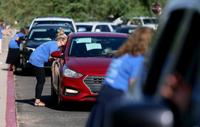
For the first day of school teachers at Manzanita Elementary School greeted their students during a "Mustang Stampede" and handed out remote learning tool kits on August 17, 2020.
"Mustang Stampede"
Updated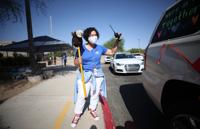
Kim Boling, principal at Manzanita Elementary School, greets her students and parents with a mustang during the "Mustang Stampede" for the first day of school on August 17, 2020.
First Day of School, John B. Wright Elementary
Updated
Yarani Martinez gives a monitor a thumbs up to inform the monitor that his online class is working after classes began at John B. Wright Elementary School, 4311 E. Linden St., in Tucson, Ariz. on August 17, 2020. About 10 students came to school for online instruction under the guidance of classroom monitors.
First Day of School, John B. Wright Elementary
Updated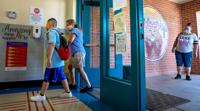
Alice Flores, right, watches as her grandson Jesus Silva is escorted to the cafeteria before classes began at John B. Wright Elementary School, 4311 E. Linden St., in Tucson, Ariz. on August 17, 2020. About 10 students came to school for online instruction under the guidance of classroom monitors.
First Day of School, John B. Wright Elementary
Updated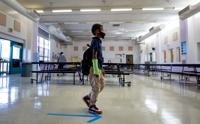
Augusta Iranzi follows the directions on the floor while being escorted to a classroom at John B. Wright Elementary School, 4311 E. Linden St., in Tucson, Ariz. on August 17, 2020. About 10 students came to school for online instruction under the guidance of classroom monitors.



